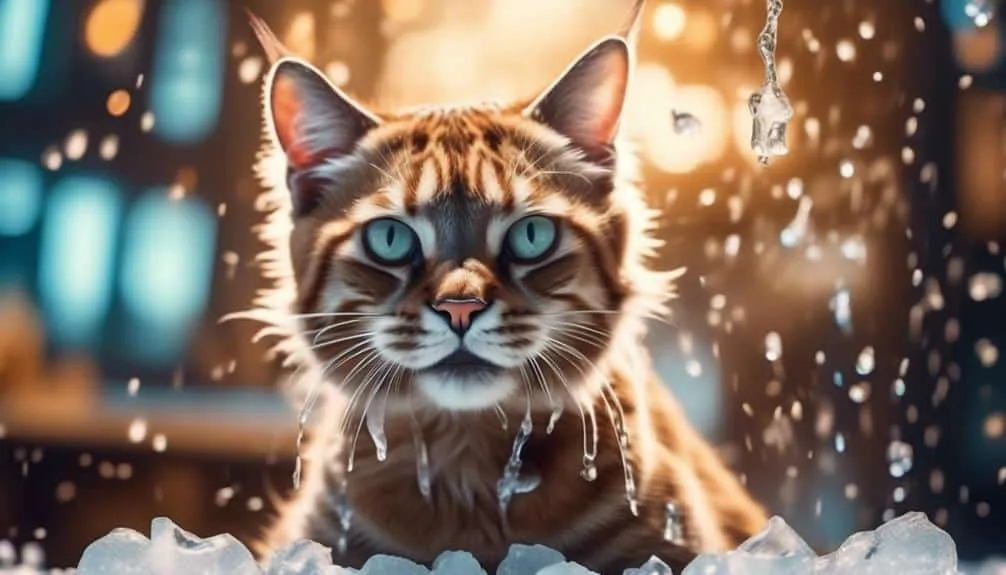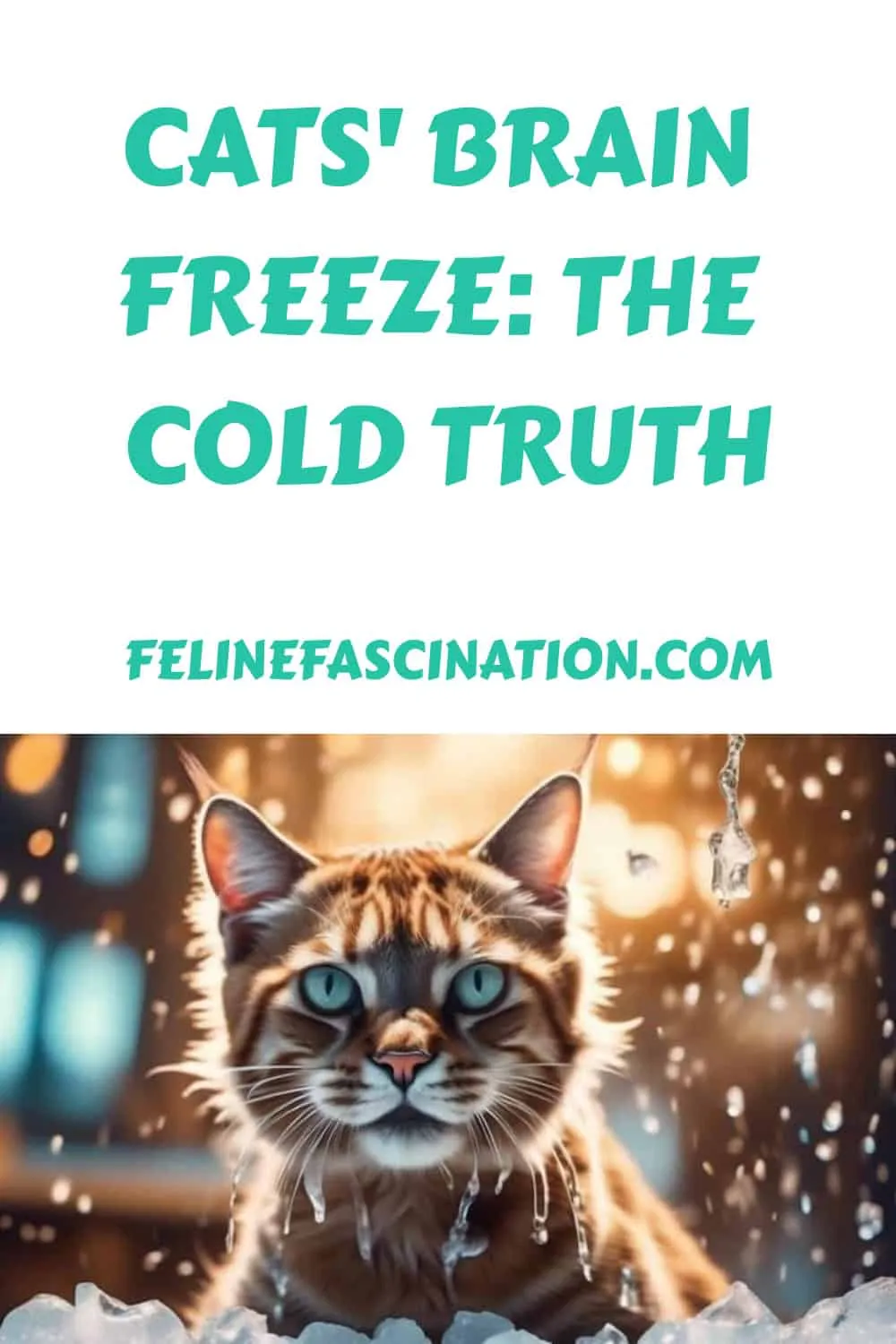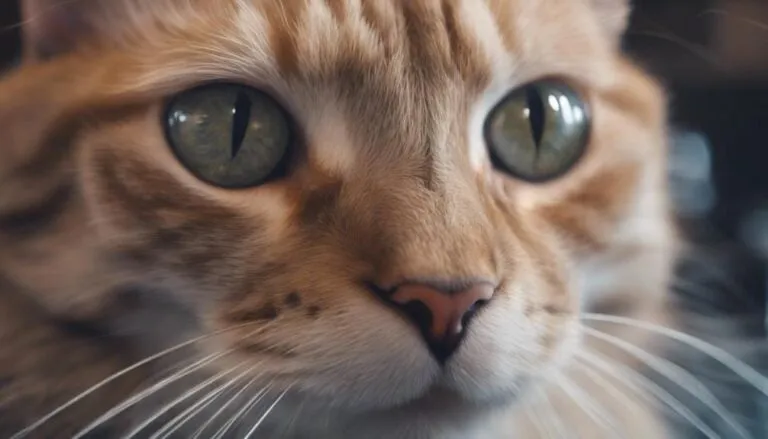The Best Fluffy Pancakes recipe you will fall in love with. Full of tips and tricks to help you make the best pancakes.

Have you ever seen a cat take a bite of something cold and immediately recoil with a look of pure confusion on its face? It's as if their brain suddenly freezes, leaving them momentarily stunned.
Well, it turns out that cats may indeed experience their own version of brain freeze. In this article, we will uncover the cold truth behind cats and brain freeze.
But before we delve into the fascinating world of feline brain reactions, let's pause for a moment and consider what this could mean for our furry friends.
Key Takeaways
- Cats have a similar brain anatomy to humans, suggesting they can experience brain freeze.
- Feeding cats cold food, such as ice cream, is not recommended due to the potential discomfort and negative health effects it may cause.
- Dental pain can cause cats to react strangely to eating something cold, indicating the importance of regular dental care for cats.
- Cats cannot communicate if they have a headache from brain freeze, highlighting the need for pet owners to be attentive to their cat's well-being and diet.
Cats and Brain Freeze
Cats, like humans, are susceptible to experiencing brain freeze when consuming cold substances. The scientific term for brain freeze is sphenopalatine ganglion neuralgia. When cold material hits the mouth or throat, blood vessels rapidly expand to warm up, triggering the pain response.
Cats have a similar brain anatomy to humans, suggesting that they can indeed feel brain freeze. However, cats can't communicate if they've a headache from brain freeze.
It's important to note that cats may react differently to cold food, and some may even react dramatically. Feeding cats ice cream, which can cause brain freeze, isn't recommended. Additionally, cats may develop a reluctance to eat if they experience brain freeze, which can lead to a potentially deadly condition called hepatic lipidosis.
It's crucial to prioritize a cat's health and well-being by avoiding deliberately causing brain freeze and providing a diet that's suitable for their needs.
What Is Brain Freeze?
Brain freeze, also known as sphenopalatine ganglion neuralgia, is a brief headache that occurs when consuming something extremely cold. The science of brain freeze involves the rapid expansion of blood vessels in the mouth and throat, triggered by the cold material. This sudden expansion activates pain receptors, leading to the sensation of a headache.
Common triggers for brain freeze include consuming ice cream, frozen beverages, or even cold food. It's important to note that cats and humans share similar brain anatomy, suggesting that cats can also experience brain freeze. However, cats can't confirm if they've experienced brain freeze, making it difficult to assess their discomfort.
Therefore, deliberately causing brain freeze in cats should be avoided, and feeding them ice cream, a common trigger for brain freeze, isn't recommended due to its negative health effects.
Similar Brain Anatomy in Cats
The neurological structure of cats closely resembles that of humans, indicating a similarity in brain anatomy. Understanding cats' response to cold stimuli, such as brain freeze, requires delving into their brain structure.
Cats possess a complex brain composed of various regions, including the cerebral cortex, cerebellum, and brainstem. These regions play crucial roles in controlling sensory perception, motor coordination, and homeostatic regulation.
Research on cats' brain freeze is limited, but it's believed that cats' brain anatomy and neural pathways involved in temperature regulation are similar to humans. However, cats can't communicate their discomfort or headache caused by brain freeze, making it challenging to fully comprehend their experience.
Further investigation into cats' brain freeze research is necessary to gain a comprehensive understanding of their response to cold stimuli.
Cats' Inability to Communicate Headaches
Cats possess a limited ability to communicate headaches resulting from brain freeze. Understanding cats' pain response can be challenging, but observing their behavior after eating cold food can provide some insight. Here are some key points to consider:
- Cats may exhibit unusual behavior such as pawing at their mouth or shaking their head.
- They might vocalize more frequently or appear agitated.
- Cats may avoid eating or show a reluctance to consume cold food.
- Some cats may display signs of discomfort, such as squinting or narrowing their eyes.
It's important to note that cats can't directly express their headache or pain.
Dental Pain as a Culprit
Dental pain can be a contributing factor to the abnormal reactions cats exhibit when consuming cold food. Cats often suffer from dental disease due to a lack of oral preventative care. This can result in pain when they eat hot, cold, or hard items.
If your cat reacts strangely to cold food, it's recommended to have a vet check their teeth. Dental cleaning or other treatments may be necessary to alleviate the pain.
Regular vet check-ups and dental cleanings can help prevent dental issues in cats and ensure their overall well-being. By addressing dental pain, you can help your cat enjoy their meals without discomfort and maintain their dental health.
Is Brain Freeze Dangerous for Cats?
Brain freeze in cats is uncomfortable, but not dangerous. Cats may react dramatically to eating cold food, even though they can't communicate if they have a headache from brain freeze. Feeding cats ice cream, which can cause brain freeze, is unhealthy and can lead to upset stomach and pancreatitis. Cats may develop a reluctance to eat if they experience brain freeze, which can be deadly if it leads to hepatic lipidosis. To prevent brain freeze, prioritize the cat's health by avoiding deliberately causing it and providing a balanced diet.
Potential Risks of Feeding Cats Ice Cream
To ensure the well-being of your feline companion, it's crucial to understand the potential risks associated with feeding them ice cream.
Feeding cats ice cream can have negative effects on their health. Ice cream contains high amounts of sugar, which can contribute to weight gain and obesity in cats. Additionally, the lactose found in dairy products like ice cream can cause digestive issues, such as diarrhea and upset stomach.
Furthermore, ice cream can trigger conditions like pancreatitis in cats, which can be life-threatening. It's important to prioritize your cat's health and provide them with alternative treats that are specifically designed for feline consumption.
There are various cat-friendly treats available in the market that are both tasty and safe for your furry friend.
Prioritizing Cats' Health and Well-being
Prioritizing the health and well-being of your feline companion is of utmost importance. To ensure their optimal health, it's crucial to consider their dietary needs and provide them with appropriate alternatives to cold treats. Here are some key points to keep in mind:
- Understand your cat's dietary requirements: Cats have specific nutritional needs that must be met for their overall well-being. Consult with a veterinarian to determine the best diet for your cat's specific requirements.
- Avoid feeding cats ice cream: Ice cream, while a popular treat for humans, isn't suitable for cats. It can cause upset stomach and pancreatitis, leading to potential health issues.
- Explore alternative cold treats: Instead of ice cream, consider offering your cat alternative cold treats that are specifically formulated for feline consumption. Look for options that are both delicious and nutritionally balanced.
- Regular veterinary check-ups: Schedule regular visits to the veterinarian to monitor your cat's health and address any potential concerns promptly. This will help ensure their overall well-being and help detect any underlying health issues.
- Maintain a balanced and nutritious diet: Providing your cat with a balanced and nutritious diet is key to their long-term health. Ensure they receive the necessary nutrients and avoid overfeeding to prevent obesity.
Frequently Asked Questions
Can Cats Communicate if They Are Experiencing Brain Freeze?
Cats cannot communicate if they're experiencing brain freeze. While they may react dramatically, they can't convey their discomfort explicitly. It's important to avoid deliberately causing brain freeze and opt for alternative treats to prioritize their well-being.
What Are the Potential Risks of Feeding Cats Ice Cream?
Feeding cats ice cream can pose potential risks and lead to digestive issues. It's important to avoid this indulgence as it may cause upset stomach and pancreatitis, compromising their health and well-being.
How Can Dental Pain Affect a Cat's Ability to Eat Cold Food?
Dental pain can affect a cat's ability to eat cold food. Cats with dental issues may experience discomfort when eating hot, cold, or hard items. Maintaining good dental hygiene is crucial for a healthy feline diet.
Are There Any Long-Term Health Effects of Brain Freeze on Cats?
Brain freeze in cats is uncomfortable but not dangerous. However, long-term effects are unknown. Cats can't communicate their symptoms, so it's crucial to prioritize their health. Avoid deliberately causing brain freeze and feeding them ice cream regularly.
How Can We Prioritize a Cat's Health and Well-Being When It Comes to Their Diet?
To prioritize your cat's health and well-being when it comes to their diet, it is crucial to follow proper cat nutrition guidelines. This ensures they receive balanced meals and avoid harmful foods that can lead to health issues.
Conclusion
In conclusion, while cats have a similar brain anatomy to humans, their inability to communicate headaches makes it unclear if they can experience brain freeze.
Feeding cats ice cream, a common cause of brain freeze, isn't recommended due to potential discomfort and negative health effects. Additionally, dental pain can contribute to how cats respond to cold food.
It's important to prioritize a cat's health and well-being by providing a suitable diet and oral preventative care.










